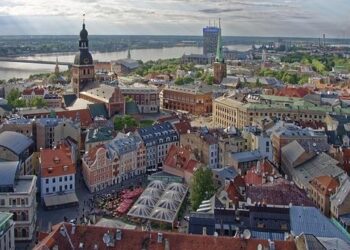In recent years, Latvia has emerged as a focal point in the broader battle against disinformation within the European Union. As geopolitical tensions intensify and digital platforms become prime arenas for influence campaigns, understanding the disinformation landscape in Latvia is critical for both regional security and democratic resilience. This article delves into the latest findings by EU DisinfoLab, a Brussels-based non-profit dedicated to exposing and analyzing misinformation networks. By mapping out the tactics, sources, and impacts of disinformation targeting Latvia, the report sheds light on the challenges faced by authorities, media, and citizens alike in safeguarding the integrity of public discourse.
Disinformation Trends Shaping Latvia’s Information Environment
Latvia’s information ecosystem is increasingly targeted by sophisticated disinformation campaigns, often amplified by state-sponsored actors aiming to destabilize regional trust and sow political discord. These campaigns frequently exploit ethno-linguistic divisions, particularly within the Russian-speaking minority, through tailored narratives that question Latvia’s sovereignty and democratic institutions. Social media platforms remain a critical battleground, where false claims about NATO presence and misinformation surrounding COVID-19 public health measures are rapidly circulated, challenging authorities’ ability to maintain an informed citizenry.
Key patterns emerging in Latvia’s disinformation environment include:
- Use of bot networks to manipulate trending topics and public opinion.
- Propagation of conspiracy theories linked to Western geopolitical interests.
- Targeted misinformation campaigns exploiting societal vulnerabilities during elections and national holidays.
- Cross-border influence operations leveraging Latvian media outlets in minority languages.
| Trend | Primary Target | Disinformation Vector |
|---|---|---|
| Ethnic Polarization | Russian-speaking communities | Social Media & Messaging Apps |
| Political Undermining | Latvian Government Institutions | Fake News Portals & Blogs |
| Health Misinformation | General Public | Viral Social Posts & Videos |
Analyzing Sources and Motivations Behind Latvia’s Disinformation Campaigns
Disinformation campaigns targeting Latvia frequently arise from a confluence of internal vulnerabilities and external geopolitical interests. Key sources include state-sponsored actors from neighboring regions seeking to undermine Latvia’s political stability and sow discord within the country. These campaigns often exploit societal divisions by amplifying ethnic tensions and mistrust in democratic institutions. Additionally, some narratives are propagated by non-state entities aiming to capitalize on Latvia’s digital media environment, where misinformation can spread rapidly with limited oversight.
Motivations behind these disinformation efforts tend to focus on eroding public confidence in the Latvian government and its alignment with Western alliances such as the EU and NATO. Disrupting social cohesion is another critical objective, achieved through carefully crafted narratives that challenge national identity and historical truth. The table below summarizes the primary actors and their strategic intents:
| Source | Primary Motivation | Common Tactics |
|---|---|---|
| Foreign State Actors | Political destabilization | Fake news, bot networks |
| Non-State Groups | Social division | Memes, trolling campaigns |
| Internal Malicious Actors | Discredit institutions | False leaks, exaggerated claims |
Strategic Measures to Combat Disinformation and Strengthen Media Literacy in Latvia
In confronting the complex challenge of disinformation, Latvia is adopting a multifaceted approach aimed at fostering critical thinking and media resilience among its citizens. Central to this effort is the implementation of educational programs that integrate media literacy curricula across schools and universities. These initiatives empower individuals to discern credible information from falsehoods, emphasizing the importance of verifying sources and understanding the digital media ecosystem. Additionally, partnerships between government agencies, NGOs, and media organizations have been strengthened to create a unified front against disinformation campaigns, especially those targeting vulnerable groups and the Latvian diaspora.
Beyond education, strategic measures include enhancing fact-checking infrastructure and leveraging technology to swiftly identify and counteract misleading narratives. A recent collaboration led to an innovative monitoring system capable of tracking misinformation trends across social platforms in real time. Key components of Latvia’s strategy include:
- Support for independent journalism that values transparency and accountability.
- Public awareness campaigns designed to educate about common disinformation tactics.
- Legislative frameworks aimed at holding actors accountable without infringing on free speech.
- Cross-border cooperation within the EU to address transnational information threats.
| Measure | Intended Impact | Status |
|---|---|---|
| Media Literacy in Schools | Youth engagement and awareness | Ongoing |
| Fact-Checking Networks | Mitigation of false news spread | Established |
| Public Campaigns | Community vigilance increase | Planned Q3-Q4 2024 |
| Legislative Review | Strengthened legal safeguards | In progress |
To Conclude
As Latvia continues to navigate the complexities of the digital age, the evolving disinformation landscape poses significant challenges to its democratic institutions and public discourse. The insights provided by the EU DisinfoLab underscore the urgent need for coordinated efforts among policymakers, media outlets, and civil society to combat misleading narratives and safeguard information integrity. Staying vigilant and informed remains essential as Latvia, alongside its European partners, works to build resilience against the growing threat of disinformation.
















